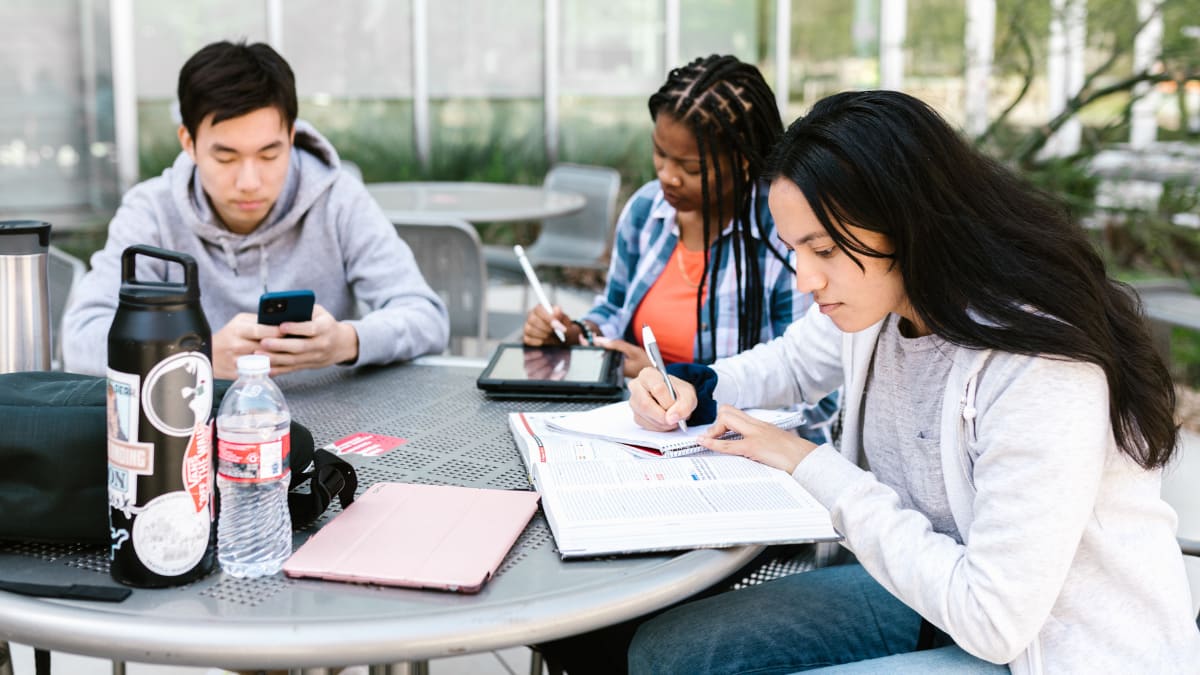60 Tips for Getting the Most out of Your College Education

Key Takeaways
- Effective Organization and Time Management: Utilize planners and prioritization techniques to manage tasks, balance academic and personal life, and set clear academic goals.
- Active Engagement and Continuous Learning: Actively participate in classes, collaborate in study groups, seek feedback, and apply theoretical knowledge to real-world scenarios for a deeper understanding.
- Holistic Development and Well-being: Engage in extracurriculars, prioritize self-care, build meaningful relationships with educators, and practice mindfulness to ensure overall well-being and holistic growth.
If you’re going to college simply to have a good time and learn the bare minimum to get your degree, then don’t read this article. But if you want to make the most out of your time in college and want to use college as a springboard to a good job and productive future, read this article and ask yourself which of the tips presented here could best help you.
Making the most of your college experience isn’t solely about academic excellence. It is also about personal growth, effective interpersonal relationships, discovering passions, and building foundational skills that will benefit you throughout life. The advice that follows aims to promote both academic and personal development, preparing you for life beyond the classroom. You want to leave college real-world skills and a rich, colorful personality.
The advice that follows will help you cultivate a diverse skill set, promote continual personal growth, and ensure that you can navigate the complexities of your educational environment with confidence and competence. Included are specific study methods that can amplify your ability to learn effectively, maximizing productivity and retention of information.
The Bottom Line: The cost of college is intimidating, but by leveraging the right strategies you can extract priceless resources throughout your education to make the cost-benefit analysis far more appealing.
Why Students Will Benefit from these Tips
The ability to learn effectively is an invaluable skill that goes beyond school and applies throughout life. By honing “learning to learn” techniques, you not only maximize your educational experiences but also set the stage for continuous personal and professional growth in the future.
Efficiency in learning, particularly in reading and typing, is a catalyst for academic success. It reduces the time spent on tasks, provides a competitive edge, and leaves room for exploring additional knowledge. By mastering such techniques, you can streamline your learning processes, making education both effective and enjoyable.
You won’t want to follow every piece of advice presented here. But you’ll want to act on at least some of them. Be mindful of what works best for you individually. Experiment with different tips to find the combination that yields the best results for your unique style of learning and interacting with fellow students and faculty.

Tips for Getting the Most from Your College Education
- Stay Organized with a Planner: Maintaining a planner helps you track assignments, test dates, and other commitments. By staying organized, you can manage your time better and ensure you meet deadlines. This practice trains your mind to think methodically and prioritize tasks effectively.
- Practice Time Management: Divide your tasks into manageable chunks, prioritize them, and tackle them systematically. Effective time management reduces stress, increases productivity, and ensures that you can balance academic and personal life effectively. You only have so much time, so use it wisely.
- Participate Actively in Class: Engage in class discussions, ask questions, and share your thoughts. Active participation enhances understanding and retention of material. It also fosters a proactive mindset, encouraging you to take charge of your learning experience.
- Form and Take Part in Study Groups: Collaborate with peers to review material, share notes, and work on projects. Study groups can offer diverse perspectives and can be especially helpful in understanding challenging concepts. They can make tackling difficult subjects more engaging and efficient. Collective brainstorming often leads to richer insights.
Source: Tips for Starting Study Groups
- Seek Feedback Actively: Regularly request feedback on your performance, whether it’s from teachers, peers, or through self-assessment. Constructive feedback helps identify areas for improvement and encourages a proactive approach to enhancing your learning experience and personal growth.
- Seek Help When Needed: If you’re struggling with a topic, reach out to teachers, tutors, or classmates. It’s better to address confusion early on than to let gaps in understanding accumulate. Seeking help shows maturity and a commitment to truly mastering the material. Don’t allow yourself to get lost. Find the help to stay on top of the material.
Source: How to Ask for Help (Harvard)
- Attend Office Hours: Use the dedicated hours teachers or professors set aside to assist students. This time allows for one-on-one guidance, deeper discussions, and can make difficult subjects more accessible. Make a point of visiting at least one office hour for each class you take. Teachers may open up to you there in ways they won’t with a full class.
Source: UCLA’s Guide to Office Hours
- Stay Curious Outside of Assigned Material: Explore subjects that intrigue you outside of the regular curriculum. This habit fosters a love for lifelong learning and helps you discover new interests and passions, making education a self-driven pursuit.
Source: Anderson University’s Guide to Staying Curious in College (PDF)
- Maintain a Healthy Balance: While academics are important, ensure you also engage in extracurricular activities, sports, or hobbies. These pursuits develop soft skills, provide stress relief, and foster holistic growth, creating a well-rounded individual.
- Develop Good Study Habits: Set specific times for studying, minimize distractions, and use study techniques that promote productivity and engagement (like the Pomodoro technique and others described below). Consistent, focused study habits improve retention and understanding, ensuring that you’re genuinely absorbing information, not just memorizing it.
- Cultivate Relationships with Educators: Building rapport with teachers and professors can offer deeper insights into subjects, provide mentorship opportunities, and be valuable for future academic or job recommendations. These relationships reinforce a supportive educational environment.
- Regularly Review and Reflect: Instead of cramming, periodically review material you’ve learned. Reflection aids in retention and helps in connecting disparate pieces of information, promoting a deeper understanding of subjects.
- Embrace Mistakes as Learning Opportunities: Don’t fear errors or less than perfect grades; use them as feedback. Understanding where you went wrong and rectifying mistakes solidifies learning and fosters resilience, preparing you for challenges beyond the classroom.
- Prioritize Self-Care: Ensure you get enough sleep, maintain a balanced diet, and engage in regular physical activity. A healthy body and mind improve concentration, reduce stress, and increase productivity, ensuring you’re at your best during your academic pursuits.
- Use Technology Wisely: Embrace apps, online resources, and tools that can enhance your learning. Platforms like Khan Academy, Quizlet, or Evernote can complement traditional learning, but remember to avoid digital distractions when studying. Turn off notifications and avoid looking at social media during study times.
- Engage in Real-World Application: Connect what you’re learning to real-world scenarios. Whether it’s through internships, field trips, or practical projects, applying theoretical knowledge solidifies understanding and makes learning more relevant.
Source: Harvard’s Guide on Connecting Course Material to the Real World
- Develop Critical Thinking Skills: Instead of passively absorbing information, challenge assumptions, analyze arguments, and make connections between topics. This promotes a deeper understanding and prepares you for complex problem-solving scenarios in the future.
Source: University of Louisville’s Guide to Critical Thinking
- Stay Updated with Current Events: Be aware of global and local happenings. Integrating current events into your studies makes learning more relatable and provides context to theoretical knowledge, fostering informed and socially aware individuals.
- Network with Peers and Alumni: Form relationships with fellow students, seniors, and alumni. Networking can provide study support, expose you to different perspectives, and offer guidance on future academic or career paths.
Source: Columbia’s Guide to Networking
- Set Clear Goals: Outline what you want to achieve academically and personally during your school years. Having clear objectives helps in maintaining focus, provides motivation, and gives a sense of purpose to your educational journey.
- Diversify Your Reading: Go beyond textbooks by exploring different genres, authors, and cultures in literature. Broadening your reading horizons can expand your worldview, improve language skills, and foster empathy and understanding of diverse perspectives.
- Take Part in Workshops and Seminars: Attend additional workshops, guest lectures, and seminars offered by your school or other institutions. These events can provide in-depth knowledge, exposure to and networking with experts in the field, and opportunities to explore new topics.
- Document Your Journey: Keep a journal or portfolio of your projects, essays, and accomplishments. Documenting your progress helps in self-reflection, preserves memories, and can be an invaluable resource when applying for higher education or jobs. Years after college, you’ll wish you kept all this material, so keep it now.
- Cultivate Public Speaking Skills: Participate in debates and presentations, or join a speaking club. Effective communication is a vital skill in both academic and professional settings, and honing this skill boosts confidence and interpersonal effectiveness.
- Explore Different Learning Styles: Everyone has a unique learning style, be it visual, auditory, or kinesthetic. Discovering and leveraging your preferred learning style can optimize your study sessions and enhance information retention.
- Travel or Take Part in Exchange Programs: If possible, take opportunities to study abroad or participate in student exchange programs. Immersion in a different culture enhances adaptability, exposes you to different education systems, and broadens your worldview.
- Practice Financial Literacy: Learn basic financial skills like budgeting, saving, and investing. With student loans and expenses being a concern for many, understanding finances early on can set a foundation for future financial health and responsibility. If you are taking student loans, know exactly what you are getting into. Additionally, make sure you are taking advantage of FAFSA if that is available to you.
- Embrace Mentorship Opportunities: Find a mentor, whether it’s a teacher, alum, or professional in a field of interest. A mentor can provide guidance, share experiences, and offer invaluable insights that can shape your academic and career path.
Source: Benefits of Mentoring (UCDavis)
- Participate in Community Service: Engage in volunteer work or community projects. Giving back instills a sense of responsibility, builds character, and offers a different perspective on the world beyond the classroom.
- Cultivate an Open Mind: Be receptive to new ideas, cultures, and methodologies. An open-minded attitude promotes adaptability, fosters lifelong learning, and prepares you for a constantly evolving world.
Source: How to Have an Open Mind (UPENN)
- Learn to Use the School Library: Take advantage of the many resources your school library offers. Let the librarians educate you about the library’s offerings. Beyond just books, libraries provide access to journals, research tools, and quiet study spaces that can enhance your academic experience.
Source: Why You Should Use School Libraries (University of Florida)
- Balance Extracurriculars: Engage in extracurricular activities such as sports, arts, or clubs. They foster teamwork, discipline, and creativity, and can provide a much-needed break from academic rigors, contributing to a well-rounded education.
Source: Boston University’s Guide to Balancing Extracurriculars
- Immerse Yourself in a New Language: Enroll in a foreign language class or join a language club. Make a point of spending time in a country of that language where you can really master it. Deeply learning a new language boosts cognitive abilities, enhances cultural appreciation, and offers advantages in the global job market.
- Be Bold in Asking Questions: Don’t hesitate to ask questions in class or during study sessions. Seeking clarification ensures you fully grasp topics, encourages critical thinking, and fosters an active learning environment. Every question that comes to mind but remains unasked is a learning opportunity missed.
- Limit Multitasking: We are not good at multitasking. Better to focus on one task at a time, especially during study sessions. Research suggests that multitasking can diminish the quality of work and lengthen task completion times. Concentrated effort enhances efficiency and comprehension.
- Attend Career Counseling Sessions: Most schools offer career guidance or counseling services, and even interview role playing. These sessions can provide insights into potential career paths, helping you align your studies and extracurricular activities with future goals.
- Practice Regular Reviews: Instead of cramming, dedicate short periods daily or weekly for reviewing familiar material. Regular review of material enhances memory retention, reduces exam stress, and promotes a deeper understanding of subjects.
- Practice Interpersonal Skills: Build and nurture relationships with peers, teachers, and school staff. Good interpersonal skills enhance collaboration, ensure a supportive learning environment, and prove to be invaluable in future professional settings.
- Stay Updated on School Announcements: Regularly check bulletin boards, school websites, or announcement platforms. Keeping abreast of school news ensures you don’t miss out on valuable opportunities, events, or essential academic information.
Source: Why You Should Keep Track of School Events (UW Stout)
- Cultivate Mindfulness and Meditation: Incorporate mindfulness exercises or meditation into your daily routine. Being present and aware can increase focus, reduce anxiety related to studying, and enhance cognitive functions, thus improving your capacity to assimilate information.
- Practice Active Listening: During lectures, focus on truly hearing and understanding the speaker instead of planning your next question or thinking about other tasks. Active listening promotes deeper comprehension and helps in retaining crucial points.
- Teach What You Learn: One of the best ways to solidify understanding is to teach the material to someone else. By explaining concepts out loud, you’re forcing yourself to process the information deeply and identify any gaps in your understanding.
- Adopt the Feynman Technique: Named after the Caltech physicist Richard Feynman, this technique breaks down complex ideas by explaining them in the simplest terms possible, as if teaching a child. If you can’t do this, you likely don’t understand the topic fully. Revisit your sources and simplify until you can. This technique uncovers areas of confusion while deepening one’s understanding and retention.
Source: Colorado University’s Guide to the Feynman Technique
- Use Memory Techniques: Use mnemonic devices such as vivid imagery, ridiculous associations, chunking, acronyms, rhymes or stories that tie unfamiliar information to familiar concepts, making it easier to recall. These techniques facilitate information retention by utilizing the brain’s propensity for patterns and associations.
- Self-Test Regularly: Before formal assessments such as class exams, informally quiz yourself or have peers quiz you. This active recall technique strengthens memory pathways and highlights areas you may need to revisit, making your study sessions more effective.
- Use Spaced Repetition: Review material multiple times over increasing intervals. Use apps like Anki or Quizlet to revisit information at increasing intervals over time. Spaced repetition capitalizes on the psychological spacing effect, enhancing long-term retention.
- Create Visual Aids: Convert your notes into mind maps, flowcharts, or diagrams. This not only suits visual learners but also aids in understanding complex topics by breaking them down into simpler, interconnected components.
- Practice a Growth Mindset: Embrace challenges and understand that struggles to learn and comprehend are a temporary part of the learning process. By adopting a growth mindset, you’ll become more resilient, adaptable, and open to new strategies and information, crucial for lifelong learning.
- Mind Mapping: Create visual diagrams that represent ideas, words, or tasks linked to a central concept. Mind maps can help clarify your thinking, organize complex ideas, and improve memory recall by providing a visual framework for your study material.
- Practice Dual Coding: This approach combines words and visuals, such as diagrams, flowcharts, or infographics. Visual aids can provide additional context, making abstract concepts more concrete and memorable.
- Engage in Chunking: Organize seemingly unrelated topics into conceptually manageable “chunks” or sections. This helps make sense of large amounts of information, rendering them digestible and easier to process and remember.
- Interleaved Practice: Instead of dedicating long hours to a single subject, mix multiple subjects or topics in one study session. This approach can improve your ability to differentiate between subjects and enhance problem-solving skills.
Source: The Benefits of Interleaved Practice (University of Iowa)
- Master Speed Reading Techniques: Start by minimizing subvocalization (saying words aloud in your head) and using a pointer (like a finger or pen) to guide your eyes. Speed reading can drastically reduce study time while retaining comprehension, enabling you to cover more material in less time. Scan and skim texts to get a basic understanding of the content, then read the important points more closely.
Source: How to Speed Read (BYU)
- Expand Vocabulary through Context: Whenever you encounter unfamiliar words, try to figure out their meanings based on context before referring to a dictionary. This not only builds vocabulary but also sharpens your reasoning skills.
- Use Vocabulary Apps: Invest time in apps like Anki, Quizlet, or Memrise, which use spaced repetition to enhance vocabulary recall. A richer vocabulary improves comprehension, expression, and academic writing quality.
Source: Tools and Apps for Vocabularly Building (University of Michigan)
- Join a Reading or Discussion Group: Engage in groups where the focus is on reading and discussing various texts. This environment encourages speed reading (to keep up with reading assignments) and offers a platform to use and understand new vocabulary through discussion.
Source: The Importance of Group Discussions (IILM University)
- Become a Fast Typist: Strive to become a fast typist, reaching 80 word per minute across all keys on the keyboard while making a minimum number of mistakes. Typing programs can monitor your progress and get you there. The time you spend becoming a fast typist is time repaid typing.
Source: How to Type Faster (Herzing)
- Type Notes Instead of Writing: If you’re a fast typist, consider typing notes during lectures or while studying. This not only enables you to capture more information but also makes it easier to organize, search, and revise content. Be sure to also write down takeaways and summaries when reviewing typed notes though, as Harvard notes benefits to both approaches.
- Embrace the Pomodoro Technique: This technique involves studying for 25 minutes straight and then taking a 5-minute break. This cycle repeats 4 times. It trains your brain to focus in short, productive bursts and reduces the mental fatigue that can come from prolonged study sessions. The regular breaks help maintain a high level of concentration and motivation.
Source: University of Illinois’ Guide to the Pomodoro Technique
- Use Active Recall: Instead of passively reading or highlighting, test yourself by trying to recall main ideas or answers to questions without looking at your notes. This method is scientifically proven to boost memory retention and helps you identify areas that need further study.






Questions Related to Getting the Most Out of College
When enrolling for a college education, you may find yourself asking an overwhelming number of questions. Below you will find some of the most common questions posed by freshman college students, along with thoughtful answers provided by experts in the field of higher education.
What is One Thing All College Freshman Should Do?
“College freshman should strive to be flexible and curious. In a successful college education, students put preconceived notions aside and meet new experiences and ideas with an open mind. Too often students go to college with rigid expectations and thus miss opportunities that would otherwise be obvious and beneficial. College at its best offers students the freedom to explore their own minds, the minds of their peers and teachers, and to identify talents and passions that might otherwise go unrealized.“- Dr. James Barham, Harvard Educated Instructor.
How Can I be the Best College Student?
“As a professor at Wake Forest University, I see students, especially freshmen, face challenges that impact their college education. A truth that applies to almost all of life’s challenges is that they are best faced collaboratively. To be the best college student and get the most out of your college experience, you need to work with others. Find fellow students to collaborate with; find a mentor to guide you. Iron sharpens iron. Sharpen others and let others sharpen you. If you do that, you will be in a much stronger position to face college challenges and will gain an abundance of learning opportunities.” Dr. Jed Macosko, Professor at Wake Forest University.
What are the Most Common Problems that College Students Face?
According to the study entitled College Students: Mental Health Problems and Treatment Considerations, one of the commonly faced problems of college education is stress and when left unchecked this stress may progress to the point of mental health problems. College students report that stress arises from academic performance, social pressure, and environmental factors. College students who are susceptible to stress should prioritize their mental health and wellbeing, and ensure that they practice self-care. Keeping yourself healthy and happy is a fundamental component of getting the most out of your college education.